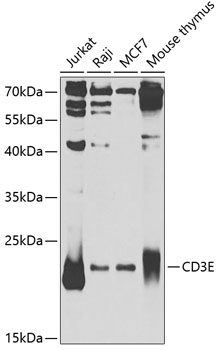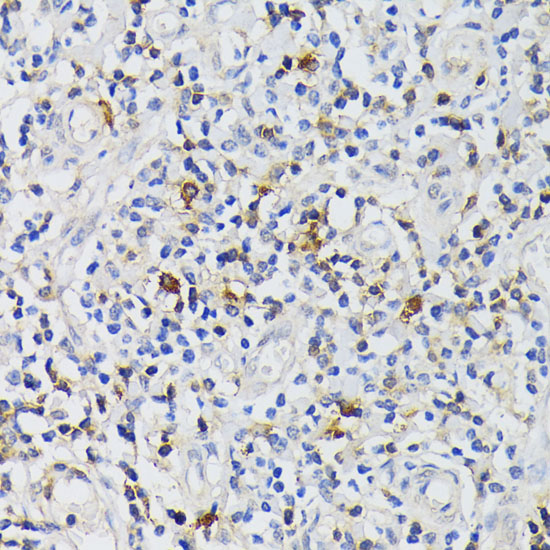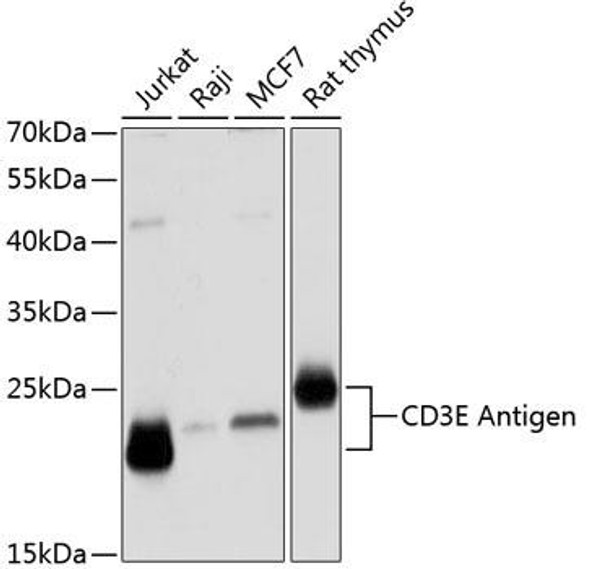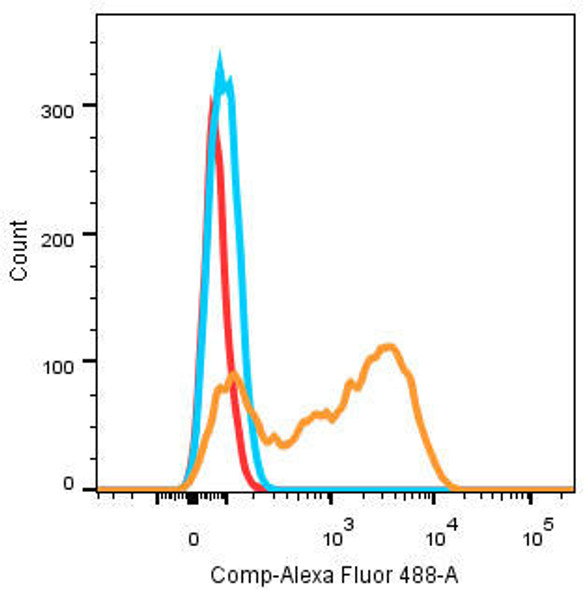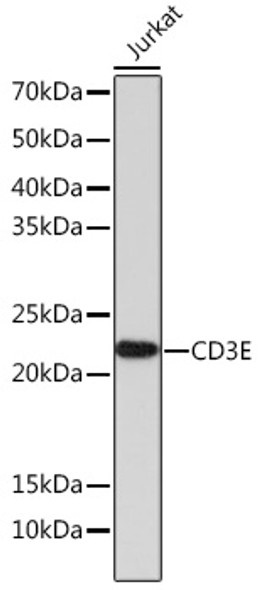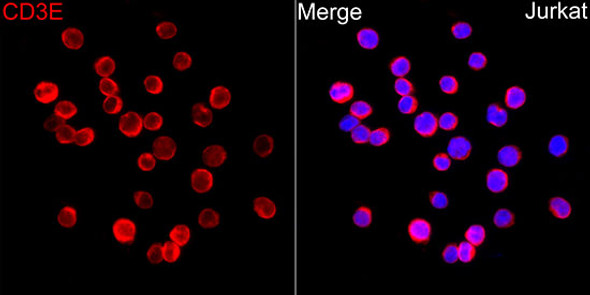Immunology Antibodies 2
Anti-CD3E Antibody (CAB1753)
- SKU:
- CAB1753
- Product Type:
- Antibody
- Reactivity:
- Human
- Reactivity:
- Mouse
- Reactivity:
- Rat
- Host Species:
- Rabbit
- Isotype:
- IgG
- Antibody Type:
- Polyclonal Antibody
- Research Area:
- Immunology
Description
| Antibody Name: | Anti-CD3E Antibody |
| Antibody SKU: | CAB1753 |
| Antibody Size: | 20uL, 50uL, 100uL |
| Application: | WB IHC IP |
| Reactivity: | Human, Mouse, Rat |
| Host Species: | Rabbit |
| Immunogen: | Recombinant fusion protein containing a sequence corresponding to amino acids 25-207 of human CD3E (NP_000724.1). |
| Application: | WB IHC IP |
| Recommended Dilution: | WB 1:500 - 1:2000 IHC 1:50 - 1:200 IP 1:50 - 1:100 |
| Reactivity: | Human, Mouse, Rat |
| Positive Samples: | Jurkat, Raji, MCF7, Mouse thymus |
| Immunogen: | Recombinant fusion protein containing a sequence corresponding to amino acids 25-207 of human CD3E (NP_000724.1). |
| Purification Method: | Affinity purification |
| Storage Buffer: | Store at -20'C. Avoid freeze / thaw cycles. Buffer: PBS with 0.02% sodium azide, 50% glycerol, pH7.3. |
| Isotype: | IgG |
| Sequence: | NEEM GGIT QTPY KVSI SGTT VILT CPQY PGSE ILWQ HNDK NIGG DEDD KNIG SDED HLSL KEFS ELEQ SGYY VCYP RGSK PEDA NFYL YLRA RVCE NCME MDVM SVAT IVIV DICI TGGL LLLV YYWS KNRK AKAK PVTR GAGA GGRQ RGQN KERP PPVP NPDY EPIR KGQR DLYS GLNQ RRI |
| Gene ID: | 916 |
| Uniprot: | P07766 |
| Cellular Location: | Cell membrane, Single-pass type I membrane protein |
| Calculated MW: | 23kDa |
| Observed MW: | 23kDa |
| Synonyms: | CD3E, IMD18, T3E, TCRE, CD3e molecule |
| Background: | The protein encoded by this gene is the CD3-epsilon polypeptide, which together with CD3-gamma, -delta and -zeta, and the T-cell receptor alpha/beta and gamma/delta heterodimers, forms the T-cell receptor-CD3 complex. This complex plays an important role in coupling antigen recognition to several intracellular signal-transduction pathways. The genes encoding the epsilon, gamma and delta polypeptides are located in the same cluster on chromosome 11. The epsilon polypeptide plays an essential role in T-cell development. Defects in this gene cause immunodeficiency. This gene has also been linked to a susceptibility to type I diabetes in women. |
| UniProt Protein Function: | CD3E: a T cell surface glycoprotein that is a component of the T cell antigen receptor. The recruitment of Nck by CD3 epsilon reveals a ligand-induced conformational change essential for T cell receptor signaling and synapse formation. Contains 1 immunoglobulin-like domain and 1 ITAM domain. |
| UniProt Protein Details: | Protein type:Receptor, misc.; Membrane protein, integral Chromosomal Location of Human Ortholog: 11q23 Cellular Component: T cell receptor complex; integral to plasma membrane; plasma membrane; immunological synapse; alpha-beta T cell receptor complex; intercellular junction; external side of plasma membrane Molecular Function:protein binding; transmembrane receptor activity; receptor signaling complex scaffold activity; protein heterodimerization activity; receptor signaling protein activity; T cell receptor binding; SH3 domain binding; protein kinase binding Biological Process: regulation of immune response; T cell activation; positive regulation of interleukin-2 biosynthetic process; signal complex assembly; positive regulation of calcium-mediated signaling; negative thymic T cell selection; T cell receptor signaling pathway; positive regulation of interleukin-4 production; regulation of apoptosis; G-protein coupled receptor protein signaling pathway; positive regulation of interferon-gamma production; positive regulation of peptidyl-tyrosine phosphorylation; cell surface receptor linked signal transduction; negative regulation of smoothened signaling pathway; T cell costimulation; protein complex assembly; positive regulation of alpha-beta T cell proliferation; positive regulation of T cell proliferation; positive regulation of T cell anergy; transmembrane receptor protein tyrosine kinase signaling pathway; response to nutrient Disease: Immunodeficiency 18 |
| NCBI Summary: | The protein encoded by this gene is the CD3-epsilon polypeptide, which together with CD3-gamma, -delta and -zeta, and the T-cell receptor alpha/beta and gamma/delta heterodimers, forms the T-cell receptor-CD3 complex. This complex plays an important role in coupling antigen recognition to several intracellular signal-transduction pathways. The genes encoding the epsilon, gamma and delta polypeptides are located in the same cluster on chromosome 11. The epsilon polypeptide plays an essential role in T-cell development. Defects in this gene cause immunodeficiency. This gene has also been linked to a susceptibility to type I diabetes in women. [provided by RefSeq, Jul 2008] |
| UniProt Code: | P07766 |
| NCBI GenInfo Identifier: | 1345708 |
| NCBI Gene ID: | 916 |
| NCBI Accession: | P07766.2 |
| UniProt Related Accession: | P07766 |
| Molecular Weight: | |
| NCBI Full Name: | T-cell surface glycoprotein CD3 epsilon chain |
| NCBI Synonym Full Names: | CD3e molecule |
| NCBI Official Symbol: | CD3E |
| NCBI Official Synonym Symbols: | T3E; TCRE; IMD18 |
| NCBI Protein Information: | T-cell surface glycoprotein CD3 epsilon chain |
| UniProt Protein Name: | T-cell surface glycoprotein CD3 epsilon chain |
| UniProt Synonym Protein Names: | T-cell surface antigen T3/Leu-4 epsilon chain; CD_antigen: CD3e |
| UniProt Gene Name: | CD3E |
| UniProt Entry Name: | CD3E_HUMAN |


